Affiliate marketing has become an integral part of the digital landscape, offering individuals and businesses lucrative opportunities to earn passive income by promoting products and services. As we step into 2024, the affiliate marketing industry continues to evolve, presenting a myriad of programs catering to various niches and interests. Whether you’re a seasoned affiliate marketer or just starting out, finding the right programs to promote can significantly impact your success. In this post, we’ll explore the 15 best affiliate marketing programs for 2024, covering a range of industries and niches to suit diverse audiences.
What Is Affiliate Marketing?
Affiliate marketing is a performance-based marketing strategy where individuals, known as affiliates, earn commissions by promoting products or services of other companies. The process typically involves four main parties: the merchant (also known as the advertiser or retailer), the affiliate (the promoter), the consumer, and the affiliate network (if applicable.)
Read also: What is Affiliate Marketing? + How to Become an Affilate Marketer
Here’s how affiliate marketing works:
- Merchant: The merchant is the company that owns the product or service being promoted. They provide the affiliate with unique tracking links or codes that the affiliate uses to promote their products.
- Affiliate: The affiliate is the individual or entity that promotes the merchant’s products or services in exchange for a commission. Affiliates can be bloggers, social media influencers, content creators, website owners, or anyone with an online presence.
- Consumer: The consumer is the person who clicks on the affiliate’s promotional link and makes a purchase or completes a desired action (such as signing up for a service or filling out a form). They are the end-users of the product or service.
- Affiliate Network: In some cases, an affiliate network acts as an intermediary between merchants and affiliates. The network provides a platform where merchants can list their affiliate programs, and affiliates can find and join multiple programs in one place. The network also handles tracking, reporting, and commission payments.
What steps are typically involved in the affiliate marketing process?
- Affiliate joins program: The affiliate selects the affiliate program(s) they want to join and signs up through the merchant’s website or affiliate network.
- Promotion: Once approved, the affiliate receives unique tracking links or codes from the merchant, which they use to promote the products or services through their online channels, such as websites, blogs, social media platforms, email newsletters, or YouTube channels.
- Consumer clicks: When a consumer clicks on the affiliate’s tracking link or uses their unique code to make a purchase or perform a desired action, the affiliate’s referral is tracked by cookies or other tracking mechanisms.
- Conversion: If the consumer completes the desired action (e.g., makes a purchase), the affiliate earns a commission, typically a percentage of the sale or a fixed amount determined by the merchant’s affiliate program terms.
- Commission payment: The affiliate network or merchant calculates the affiliate’s earnings based on the agreed-upon commission structure and pays out commissions to the affiliate on a predetermined schedule, usually monthly.
Affiliate marketing offers several benefits for both merchants and affiliates. Merchants can increase their sales and reach new audiences without upfront marketing costs, while affiliates can monetize their online platforms and earn passive income by promoting products or services they believe in.
Top 15 Affiliate Programs
1. Amazon Associates
Amazon Associates is a widely recognized affiliate marketing program offered by the e-commerce giant, Amazon. It allows individuals and businesses to earn commissions by promoting products available on the Amazon platform. Affiliates can choose from a vast selection of products across various categories, including electronics, books, clothing, and more, making it suitable for a wide range of audiences and niche markets. With its user-friendly interface, robust tracking system, and competitive commission rates, Amazon Associates remains a popular choice for affiliate marketers looking to monetize their online presence and tap into Amazon’s extensive customer base.
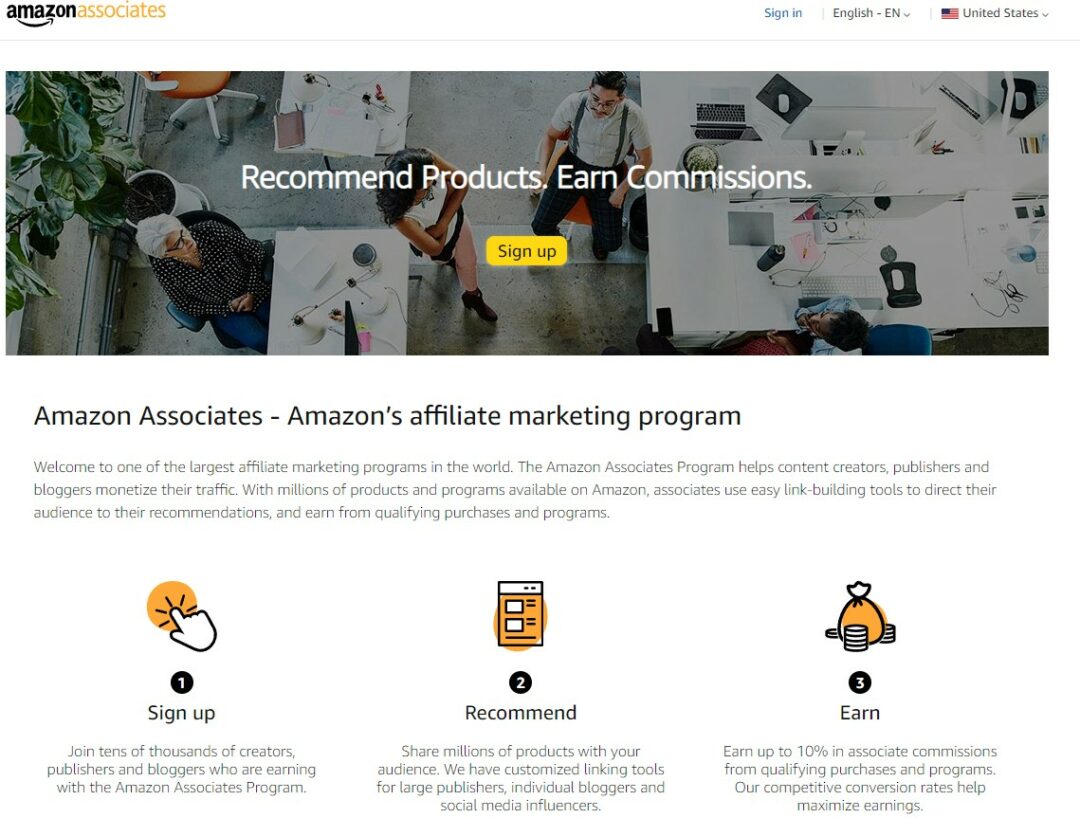
| Pros: – Vast product selection across numerous categories. – Reliable tracking and reporting tools for affiliates. – Trust and recognition associated with the Amazon brand, leading to potentially higher conversion rates. | Cons: – Relatively low commission rates, especially for certain product categories. – Commission structure subject to change, impacting affiliate earnings unpredictably. – Stringent affiliate policies and rules, requiring careful compliance to avoid account issues. |
2. ClickBank
ClickBank is a prominent online marketplace that specializes in digital products, offering a wide range of e-books, courses, software, and other digital goods. It provides a platform for both product creators and affiliate marketers, allowing them to connect and collaborate in promoting and selling digital products. ClickBank’s user-friendly interface and robust tracking system make it a popular choice among affiliates seeking opportunities to earn commissions by promoting digital products to their audiences. With its vast selection of products across various niches and competitive commission rates, ClickBank remains a go-to platform for individuals looking to monetize their online presence through affiliate marketing.
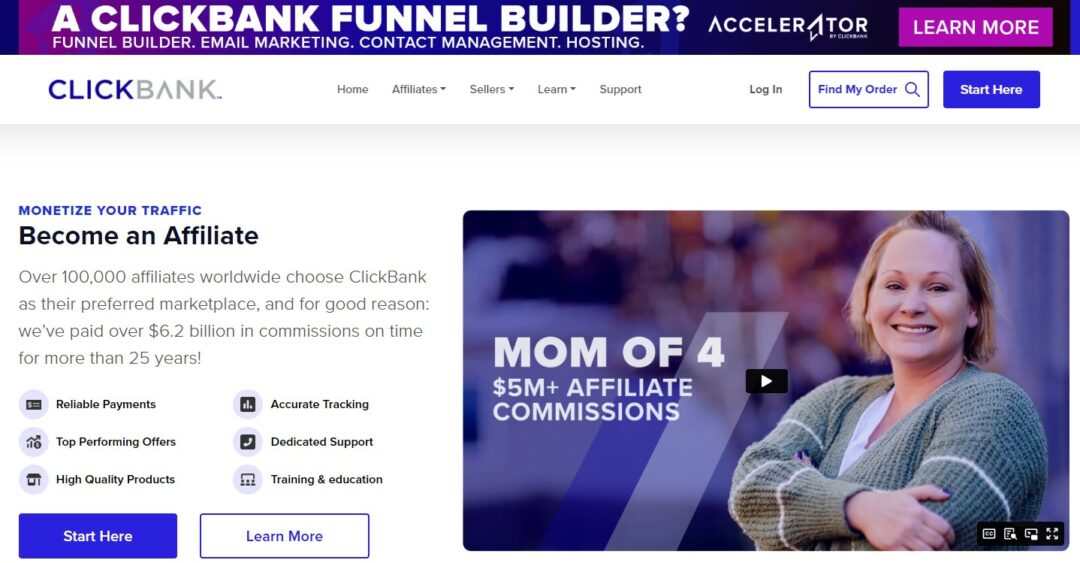
| Pros: – Wide range of digital products available for promotion. – User-friendly platform for both affiliates and product creators. – Competitive commission rates. – Robust tracking and reporting system. | Cons: – Some products may have low quality or questionable value. – Refund rates can be relatively high. -Limited customer support for affiliates. – Can be competitive due to the large number of affiliates promoting similar products. |
3. ShareASale
ShareASale is a robust affiliate network that connects merchants with affiliates across multiple industries. With a diverse range of merchants and products, affiliates can find lucrative opportunities to promote products and earn commissions.

| Pros: – Wide range of merchants and products. – User-friendly interface. – Reliable tracking and reporting tools. | Cons: – Can be overwhelming for beginners due to the sheer number of merchants. – Some merchants may have lower commission rates compared to other affiliate networks. – Limited payment options for affiliates outside the United States. |
4. CJ Affiliate (formerly Commission Junction)
CJ Affiliate is one of the largest affiliate networks, boasting a network of thousands of advertisers and publishers. Affiliates can access a wide variety of products and services to promote, along with advanced tracking and reporting tools to optimize their campaigns.

| Pros: – Extensive network of reputable advertisers. – Robust tracking and reporting tools. – Variety of promotional materials available. – Timely and reliable commission payments. | Cons: – Can be overwhelming for beginners due to the large number of advertisers. – Some advertisers may have strict approval requirements. – Commission rates vary widely among advertisers. – Customer support can be inconsistent. |
5. Rakuten Marketing
Rakuten Marketing, formerly known as Rakuten Affiliate Network, offers a comprehensive platform for affiliate marketers. With a global presence and partnerships with top brands, affiliates can leverage Rakuten’s resources to maximize their earnings potential.

| Pros: – Rakuten Marketing boasts one of the largest affiliate networks, offering access to a diverse range of advertisers and products. – As a well-established affiliate network, Rakuten Marketing is trusted by both advertisers and affiliates, enhancing credibility and trustworthiness. – Rakuten Marketing provides affiliates with advanced tracking and reporting tools, enabling them to optimize their marketing efforts and maximize earnings. | Cons: – Rakuten Marketing often requires affiliates to meet a minimum payment threshold before receiving commissions, which can be challenging for smaller affiliates. – Some affiliates report experiencing limited support and communication from Rakuten Marketing’s customer service team, especially during peak periods. – The platform’s interface may be overwhelming for new affiliates, requiring time to learn and navigate effectively. |
6. eBay Partner Network
eBay Partner Network enables affiliates to earn commissions by driving traffic and sales to eBay’s marketplace. With millions of products available for promotion, affiliates can tap into eBay’s vast network of buyers to earn commissions on qualifying purchases.
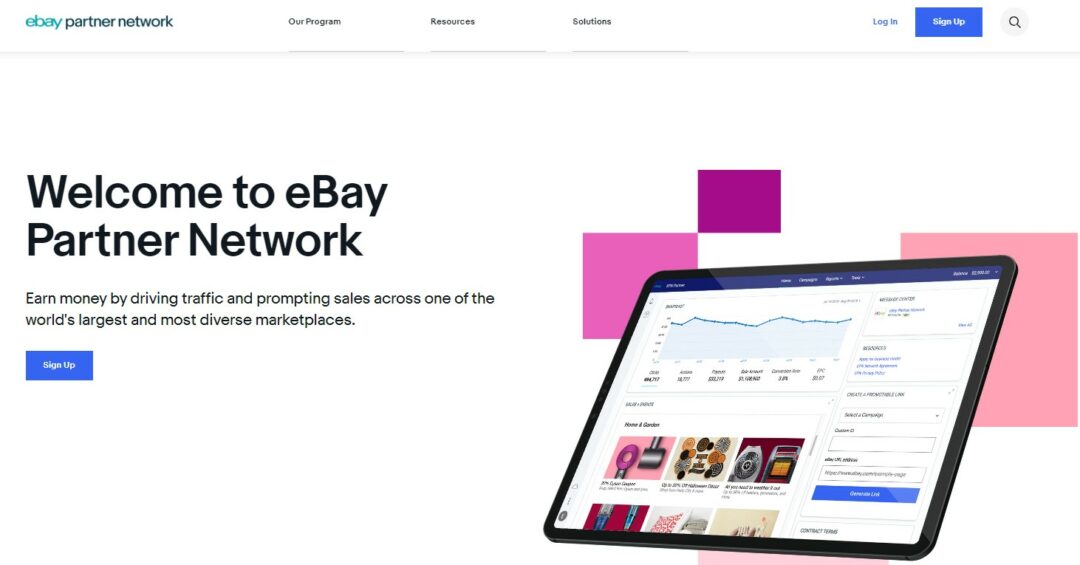
| Pros: – eBay Partner Network offers access to a vast array of products in diverse categories, providing affiliates with ample opportunities to find products relevant to their audience. – eBay is a well-established and trusted brand, which can enhance the credibility of affiliates promoting its products. – With a presence in multiple countries, eBay Partner Network allows affiliates to target audiences worldwide, expanding their earning potential. | Cons: – eBay Partner Network tends to offer relatively low commission rates compared to other affiliate programs, which may impact affiliates’ earning potential. – The cookie duration for eBay Partner Network is shorter than some other affiliate programs, resulting in a limited window for affiliates to earn commissions on referred sales. – The popularity of eBay means that affiliates may face stiff competition, making it challenging to stand out and drive sales. |
7. Shopify Affiliate Program
Shopify’s affiliate program allows affiliates to earn commissions by referring merchants to the Shopify platform. With a generous commission structure and recurring earnings potential, affiliates can capitalize on the growing e-commerce trend.

| Pros: – Shopify Affiliate Program offers recurring commissions, allowing affiliates to earn passive income for as long as their referrals remain subscribed to Shopify’s services. – Shopify is a leading e-commerce platform with a user-friendly interface and robust features, resulting in high conversion rates for affiliates. – Shopify provides affiliates with access to a range of promotional materials, resources, and dedicated support to help them succeed in promoting the platform. | Cons: – The popularity of Shopify means that affiliates may face significant competition from other marketers promoting similar products and services. – Shopify Affiliate Program has a minimum payout threshold that affiliates must reach before they can withdraw their earnings, which may be challenging for those with low referral volumes. – Affiliates may find it challenging to promote Shopify exclusively if their audience is interested in a broader range of products beyond e-commerce solutions. |
8. Bluehost Affiliate Program
Bluehost offers one of the most popular affiliate programs in the web hosting industry. Affiliates can earn substantial commissions by promoting Bluehost’s hosting services, which are trusted by millions of website owners worldwide.

| Pros: – Offers competitive commission rates, providing affiliates with the potential for significant earnings. – A well-known and reputable web hosting provider, making it easier for affiliates to promote its services to their audience. – Provides reliable tracking of referrals and timely payments to affiliates, ensuring transparency and trust in the program. | Cons: – Affiliates may need to reach a minimum payout threshold before receiving their commissions, which can delay earnings for some. -The nature of web hosting services often involves a longer sales cycle, requiring affiliates to wait longer to earn commissions on referrals. – The web hosting industry is highly competitive, making it challenging for affiliates to differentiate themselves and attract referrals amidst numerous alternatives. |
9. ClickFunnels Affiliate Program
ClickFunnels’ affiliate program provides affiliates with the opportunity to earn recurring commissions by promoting ClickFunnels’ suite of marketing tools and software. With high-converting sales funnels and a dedicated affiliate support team, affiliates can achieve significant earnings over time.

| Pros: – Offers generous commissions, including recurring revenue opportunities, allowing affiliates to earn substantial income over time. – Provides high-quality marketing and sales funnel software, making it easier for affiliates to promote products they believe in and that provide value to their audience. – Offers affiliates access to a range of promotional materials, training resources, and support, helping them succeed in their affiliate marketing efforts. | Cons: – ClickFunnels’ focus on sales funnels and marketing automation may limit its appeal to affiliates outside of the digital marketing and entrepreneurship niches. – The popularity of ClickFunnels means affiliates may face significant competition, requiring them to employ effective marketing strategies to stand out and drive sales. – Commission structure can be complex, with different commission rates and payout thresholds for various products and services, requiring affiliates to carefully track and manage their earnings. |
10. Udemy Affiliate Program
Udemy’s affiliate program allows affiliates to earn commissions by promoting Udemy’s extensive library of online courses. With a wide range of topics and high-quality content, affiliates can attract learners from around the world and earn commissions on course sales.
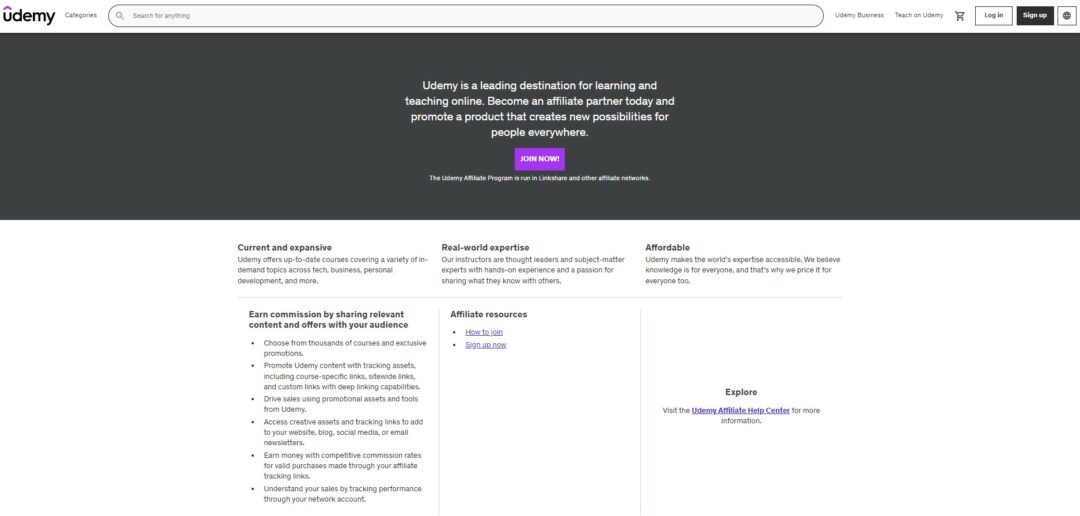
| Pros: – Offers a wide range of high-quality courses on various topics, making it easier for affiliates to promote valuable content to their audience. – Offers competitive commission rates, providing affiliates with the opportunity to earn significant income for promoting courses. – With courses available in multiple languages and a global audience, affiliates can target diverse demographics worldwide, expanding their earning potential. | Cons: – The cookie duration for the Udemy Affiliate Program is relatively short, meaning affiliates have a limited window to earn commissions on referred sales. – Udemy’s refund policy allows customers to request refunds within a certain period, which can result in commissions being clawed back from affiliates if refunds occur. – The pricing of Udemy courses can vary, and some courses may be priced lower, resulting in lower commission earnings for affiliates compared to higher-priced courses. |
11. SEMrush Affiliate Program
SEMrush offers an affiliate program that rewards affiliates for promoting its suite of digital marketing tools. With competitive commissions and a range of promotional materials, affiliates can target digital marketers and website owners looking to improve their online presence.

| Pros: – SEMrush Affiliate Program offers generous commission rates, allowing affiliates to earn substantial income for referring customers. – SEMrush is a well-known and respected brand in the digital marketing industry, making it easier for affiliates to promote its products to their audience. – Offers recurring commissions for referred customers who continue their subscriptions, providing affiliates with ongoing passive income. | Cons: – The digital marketing niche is highly competitive, which may make it challenging for affiliates to stand out and attract referrals. – SEMrush’s suite of tools may be complex for some users, leading to potential barriers in promoting and convincing referrals to purchase. – The cookie duration for SEMrush Affiliate Program may be relatively short, resulting in a narrow window for affiliates to earn commissions on referred sales. |
12. HubSpot
HubSpot’s affiliate program stands out as one of the top 15 affiliate programs you shouldn’t overlook. With its robust features and benefits, it offers a lucrative opportunity for affiliates to earn commissions by promoting HubSpot’s products and services. HubSpot’s reputation for excellence in inbound marketing, sales, and customer service makes it a highly attractive choice for affiliate marketers looking to partner with a trusted brand. If you’re seeking an affiliate program with great potential for earning and growth, HubSpot’s offering is definitely one you can’t afford to miss.
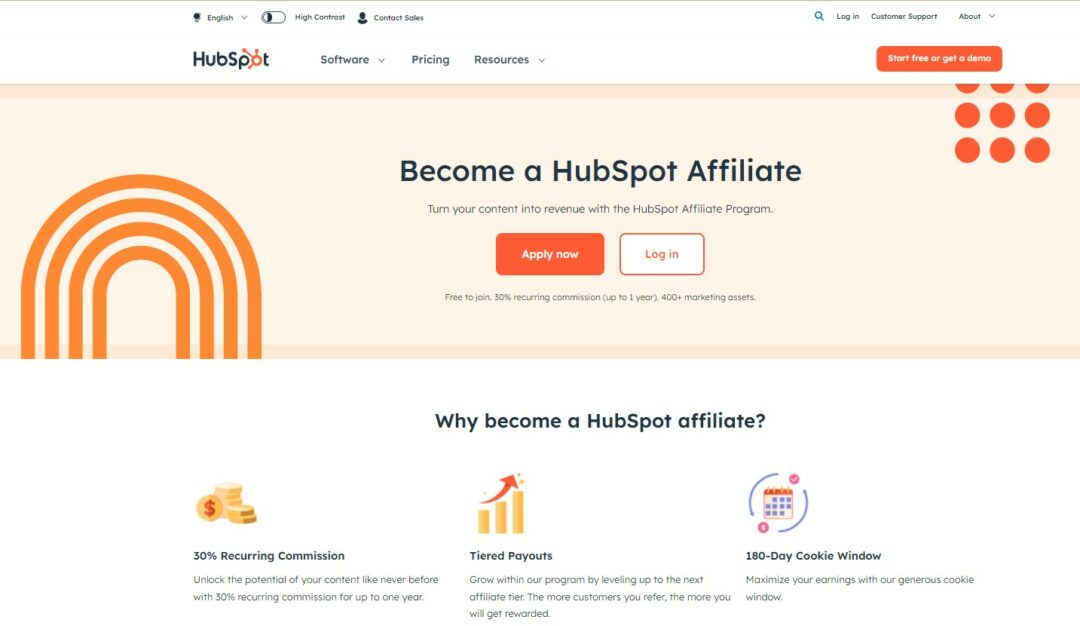
| Pros: – High commission rates. – Trusted brand with a strong reputation. – Quality products and services. | Cons: – Strict qualification criteria for affiliates. – Limited promotional materials provided. – Potential competition from other affiliates. |
13. ClickMagick Affiliate Program
ClickMagick offers an affiliate program for affiliates interested in promoting its link tracking and optimization software. With recurring commissions and advanced tracking features, affiliates can target online marketers and businesses seeking to maximize their ROI.
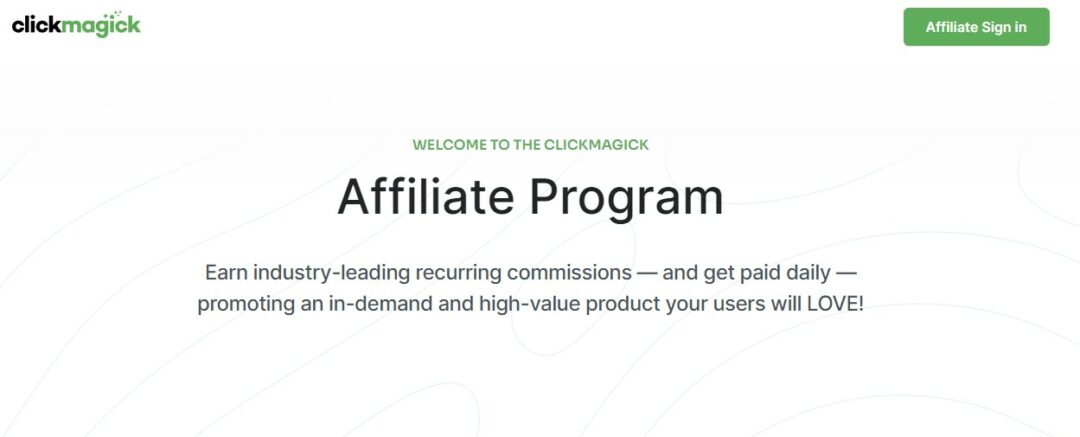
| Pros: – ClickMagick Affiliate Program offers competitive commissions, providing affiliates with the opportunity to earn significant income for referrals. – ClickMagick is a leading link tracking and optimization platform, known for its reliability and effectiveness, making it easier for affiliates to promote a product they believe in. – Offers recurring commissions for referred customers who continue to use the platform, allowing affiliates to earn passive income over time. | Cons: – ClickMagick’s focus on link tracking and optimization may limit its appeal to affiliates operating in broader niches, potentially reducing the pool of potential customers. – Some affiliates may find the technical aspects of link tracking and optimization challenging, requiring additional time and effort to effectively promote ClickMagick. – The affiliate marketing space for tracking tools is competitive, with other similar platforms vying for affiliates’ attention and referrals. |
14. Teachable Affiliate Program
Teachable’s affiliate program allows affiliates to earn commissions by promoting Teachable’s online course creation platform. With a user-friendly interface and customizable course options, affiliates can attract instructors and entrepreneurs looking to monetize their expertise.

| Pros: – Teachable offers affiliates the opportunity to earn recurring commissions on subscriptions, providing a steady stream of income. – The platform’s user-friendly interface and high-quality courses contribute to higher conversion rates, increasing affiliates’ earning potential. – Provides affiliates with dedicated support and resources, including marketing materials and affiliate training, to help them succeed. | Cons: Teachable primarily offers online courses, which may limit the appeal for affiliates seeking to promote a diverse range of products. – The online education niche is highly competitive, making it challenging for affiliates to stand out and attract customers. – Teachable’s payment threshold may be relatively high, requiring affiliates to reach a certain earnings threshold before receiving payouts. |
15. Awin Affiliate Network
Awin is a global affiliate marketing network that connects affiliates with advertisers across multiple verticals. With access to top brands and competitive commission rates, affiliates can monetize their traffic and audience effectively.

| Pros: – Awin boasts a large and diverse network of merchants, providing affiliates with a wide range of products and industries to promote. – Awin offers robust tracking and reporting tools, allowing affiliates to monitor their performance and optimize their campaigns effectively. – With operations in multiple countries, Awin enables affiliates to target international audiences, potentially increasing their earning potential. | Cons: – Awin may have stricter approval requirements compared to other affiliate networks, making it challenging for new affiliates to join. – Affiliates may incur setup fees and deposits upon joining Awin, which can be a barrier for those with limited resources. – Some affiliates may find Awin’s commission structure less favorable compared to other networks, with lower commission rates or longer payment cycles. |
In conclusion,
2024 has proven to be a promising year for affiliate marketing, with an array of lucrative programs that offer significant earning potential for both seasoned affiliates and newcomers alike. The 15 programs highlighted in this guide represent some of the most promising opportunities in the industry, covering a diverse range of niches and catering to various audience interests.
As the digital landscape continues to evolve, affiliate marketers must remain agile and adaptable, constantly seeking out new strategies and staying abreast of emerging trends. By leveraging the right combination of programs, content creation techniques, and marketing channels, affiliates can unlock a veritable goldmine of earning potential in the affiliate marketing space.
However, success in affiliate marketing doesn’t come overnight. It requires dedication, persistence, and a willingness to learn from both successes and failures. Building a sustainable affiliate business takes time and effort, but the rewards can be significant for those who are willing to put in the work.
As you embark on your affiliate marketing journey in 2024, remember to focus on providing value to your audience, building trust through authenticity and transparency, and continually refining your strategies to adapt to changing market conditions. With the right approach and a commitment to excellence, the opportunities in affiliate marketing are truly limitless.




0 Comments